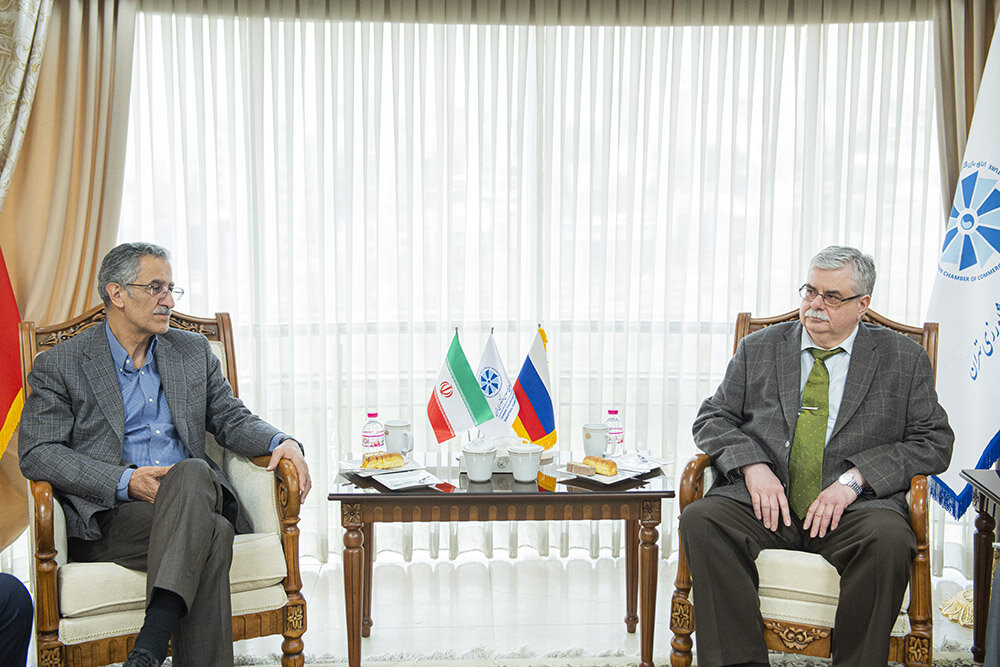Tehran, Moscow stress expansion of co-op to facilitate transport, transit ties

TEHRAN- During a meeting between the head of the Tehran Chamber of Commerce, Industries, Mines and Agriculture (TCCIMA) and the Russian ambassador to Iran at the place of TCCIMA on Saturday, the two sides stressed the need to expand cooperation between the two countries to facilitate relations in transport and transit sectors.
TCCIMA Head Masoud Khansari and the Russian envoy, Alexey Dedov, also emphasized the expansion of economic relations between the two countries and the strengthening of the cooperation between the Russian Embassy and the Tehran Chamber to facilitate business relations between the private sector companies of Iran and Russia.
The Russian ambassador pointed out the history and forward-looking activity of the Tehran Chamber in the development of Iran's trade relations with other countries, including Russia, and by stating that the level of trade relations between the two countries has reached more than 4 billion dollars, with a significant leap compared to last year, he mentioned the measures and economic policies of the Russian government in line with the expansion of relations with Iran, and in this regard, he announced the planning of the Russian government to create a sea corridor from the Russian port in the Baltic Sea to Bandar Abbas in the south of Iran.
Emphasizing the importance of expanding the economic relations between the enterprises of the two countries, the envoy stated that the cooperation and consensus of the Russian Embassy with the Tehran Chamber in the direction of advancing the relations between the private sectors of Iran and Russia and unraveling the existing obstacles and problems will develop in the coming period.
In this meeting, the TCCIMA head referred to the reception of 12 trade delegations from the Russian Federation in the Tehran Chamber in the last few months and the sending of various trade delegations to some provinces of Russia, and clarified that with the exchange of the trade delegations, the knowledge and awareness of the enterprises of the two countries from each other will increase, and in this way, the capacity of economic cooperation will be identified and exploited by enterprises.
Khansari, in this regard, announced the readiness of the TCCIMA to develop relations between this chamber and the Russian Embassy in Tehran and to use the tools and facilities of both sides with the aim of facilitating trade and economic relations between Iran and Russia and emphasized taking measures to launch the North-South Corridor and the proper use of existing capacities to facilitate the transit of goods between the two countries.
Iranian capital Tehran hosted a grand Iran-Russia business forum at Espinas Palace Hotel on November 15 in which the Iranian and Russian traders and officials exchanged views on the expansion of economic cooperation.
Organized by the Iran Chamber of Commerce, Industries, Mines and Agriculture (ICCIMA), the event was participated by the 120-member Russian delegation as well as businesspeople and officials from Iran.
Iran and Russia traded as much as $4.63 billion worth of commodities over the past Iranian calendar year (ended on March 20), according to an April report by the Islamic Republic of Iran Customs Administration (IRICA).
Earlier in November, Igor Yevgenyevich Levitin, aide to the president of the Russian Federation, had also visited Iran on top of a high-ranking delegation to meet with the former Iranian Transport and Urban Development Minister Rostam Qasemi and discuss the expansion of transport ties.
Iran and Russia have taken significant steps for removing the U.S. dollar from their bilateral trade, launching a settlement system to use their national currencies in economic exchanges.
Iran’s Integrated Forex Market launched the Ruble/Rial currency pair in early July, following a visit of Central Bank of Iran (CBI) Governor Ali Saleh-Abadi to Moscow.
The new arrangement means the two countries can now settle trading debts in each other’s currencies. The first trade took place on July 19, the day that Russia’s President Vladimir Putin arrived in Iran for talks with Leader of the Islamic Revolution Seyyed Ali Khamenei and President Ebrahim Raisi.
As reported, the new monetary system could significantly reduce the two sides’ demand for dollars. Bilateral trade between Iran and Russia stood at four billion dollars in 2021 but the two countries say they are hoping to ramp up bilateral trade to eight billion dollars in the short term.
The new trading arrangement allows them to avoid the use of dollars and, by doing so, also sidestep the impact of the U.S. sanctions.
On October 6, Russian Prime Minister Mikhail Vladimirovich Mishustin said that the development of relations between Iran and Russia is the best answer to illegal sanctions.
The official made the remarks in a meeting with Iran's First Vice President Mohammad Mokhber on the sidelines of the Second Caspian Economic Forum in Moscow.
The meeting was participated by high-ranking delegations from the two countries.
Referring to the friendly and good neighborly relations between the two countries, the Russian official said Moscow is interested in expanding and deepening cooperation with Tehran in all fields.
Reiterating that the expansion of relations between the two countries is the best answer to the illegal sanctions against Iran and Russia, the Russian official added: “We welcome the presence and activity of Iranian companies in Russia and the field of activity and cooperation is available for our partners in Russia.”
Despite the sanctions, the companies of the two countries are cooperating, and Russian companies have taken good actions in the field of joint investment and cooperation in the energy sector and new oil and gas fields, Mishustin added.
MA/MA
Photo: TCCIMA Head Masoud Khansari (L) and Russian Ambassador to Tehran Alexey Dedov
